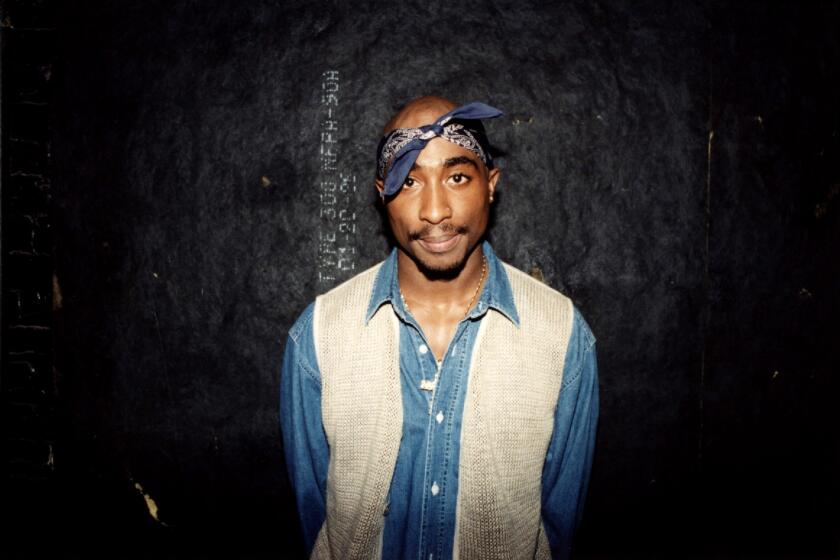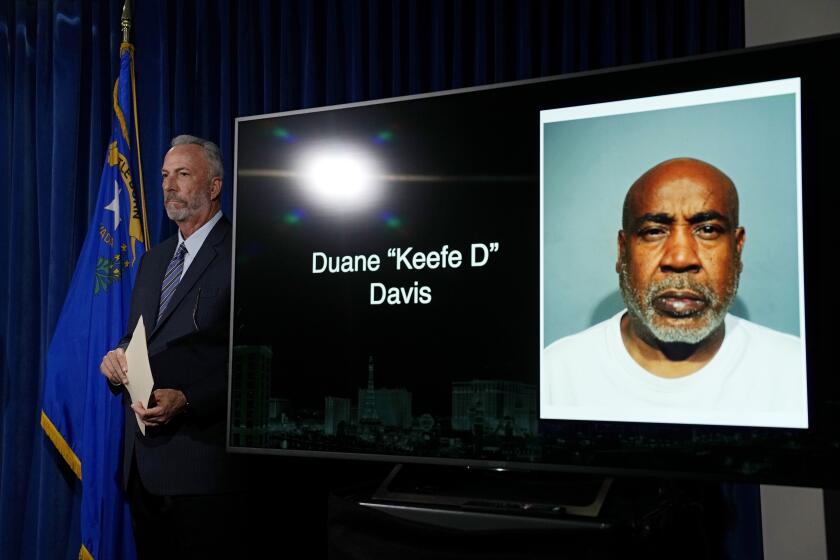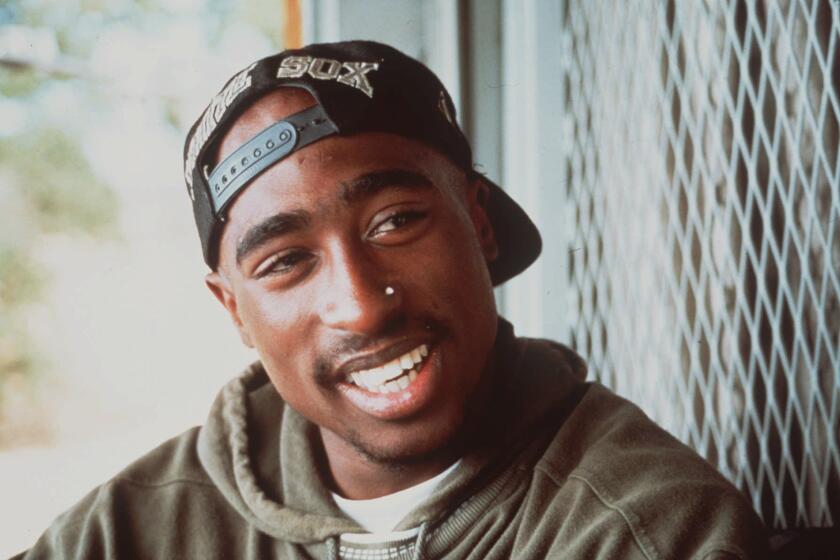Suspect charged in Tupac Shakur’s fatal shooting makes first court appearance in Las Vegas

LAS VEGAS — A self-described gangster who police and prosecutors say masterminded the 1996 shooting death of Tupac Shakur in Las Vegas made his first court appearance Wednesday on a murder charge.
Duane “Keffe D” Davis, 60, stood shackled, wearing a dark blue jail uniform and plastic orange slippers. He was scheduled to be arraigned on the charge Wednesday, but the hearing was cut short after he asked Clark County District Judge Tierra Jones to postpone the hearing while he retains counsel in Las Vegas.
Mopreme Shakur, the late rapper’s stepbrother, wasn’t in court Wednesday but told the Associated Press that he’s been following developments in the case from his home in Los Angeles, as he and his family are “trying to manage our expectations.”
“Young Black men often deal with delayed justice because we’re often viewed as the criminals,” he said. “So justice has been delayed for quite some time — in spite of all the eyes, all the attention, despite the celebrity of my brother.”
Davis was arrested Friday near his home in suburban Henderson, Nev. A few hours later, a grand jury indictment was unsealed in Clark County District Court charging him with murder. Davis denied a request from the AP for an interview from jail where he’s being held without bond.
Grand jurors also voted to add sentencing enhancements for the use of a deadly weapon and alleged gang activity. If Davis is convicted, that could add decades to his sentence. In Nevada, a person can be convicted of murder for helping another person commit the crime.
Duane ‘Keffe D’ Davis, 60, is indicted on a charge of murder in connection with the 1996 shooting death of rapper Tupac Shakur in Las Vegas.
Los Angeles-based attorney Edi Faal said in a brief phone call after the hearing that he is Davis’ longtime personal lawyer and is helping him find a Nevada attorney.
“I have worked with him for more than two decades,” Faal said. “But at this point I do not have a comment.”
Davis had been a long-known suspect in the case and publicly admitted his role in the killing in interviews before his 2019 memoir, “Compton Street Legend.”
“There’s one thing that’s for sure when living that gangster lifestyle,” he wrote. “You already know that the stuff you put out is going to come back; you never know how or when, but there’s never a doubt that it’s coming.”
In his 2019 memoir and in several interviews, Davis admitted to riding in the car from which the fatal shots were fired at the Los Angeles hip-hop legend. Davis was taken into custody Friday morning.
Davis’ own comments revived the police investigation that led to the indictment, police and prosecutors said. In mid-July, Las Vegas police raided Davis’ home, drawing renewed attention to one of hip-hop music’s most enduring mysteries.
Prosecutors allege Shakur’s killing stemmed from a rivalry and competition for dominance in a musical genre that, at the time, was dubbed “gangsta rap.” It pitted East Coast members of a Bloods gang sect associated with rap music mogul Marion “Suge” Knight against West Coast members of a Crips sect that Davis has said he led in Compton.
Tension escalated in Las Vegas the night of Sept. 7, 1996, when a brawl broke out between Shakur and Davis’ nephew, Orlando “Baby Lane” Anderson, at the MGM Grand hotel-casino after a heavyweight championship boxing match won by Mike Tyson.
Nearly three decades ago, Tupac Shakur was riding in a BMW driven by Death Row Records boss Marion “Suge” Knight.
Knight and Shakur went to the fight, as did members of the South Side Crips, prosecutor Marc DiGiacomo said last week in court. “And [Knight] brought his entourage, which involved Mob Piru gang members.”
After the casino brawl, Knight drove a BMW with Shakur in the front passenger seat. The car was stopped at a red light near the Las Vegas Strip when a white Cadillac pulled up on the passenger side and gunfire erupted.
Davis has said he was in the front passenger seat of the Cadillac and handed a .40-caliber handgun to his nephew in the back seat, from which he said the shots were fired.
Crime: Artist known for songs of violence and regrets had been in critical condition since Las Vegas shooting.
Shot multiple times, Shakur died a week later at age 25. Knight was grazed by a bullet fragment. Now 58, he is serving a 28-year prison sentence for running over and killing a Compton businessman outside a burger stand in January 2015.
Among the four people in the Cadillac that night, Davis is the only one who is still alive. Anderson died in a May 1998 shooting in Compton. Before his death, Anderson denied involvement in Shakur’s death. The other backseat passenger, DeAndre “Big Dre” or “Freaky” Smith, died in 2004. The driver, Terrence “Bubble Up” Brown, died in a 2015 shooting in Compton.
Sheriff Kevin McMahill, who oversees the Las Vegas Metropolitan Police Department, has rejected criticism that his agency was slow to investigate Shakur’s killing.
“That was simply not the case,” McMahill said. He called the investigation “important to this police department.”
More to Read
Sign up for Essential California
The most important California stories and recommendations in your inbox every morning.
You may occasionally receive promotional content from the Los Angeles Times.













